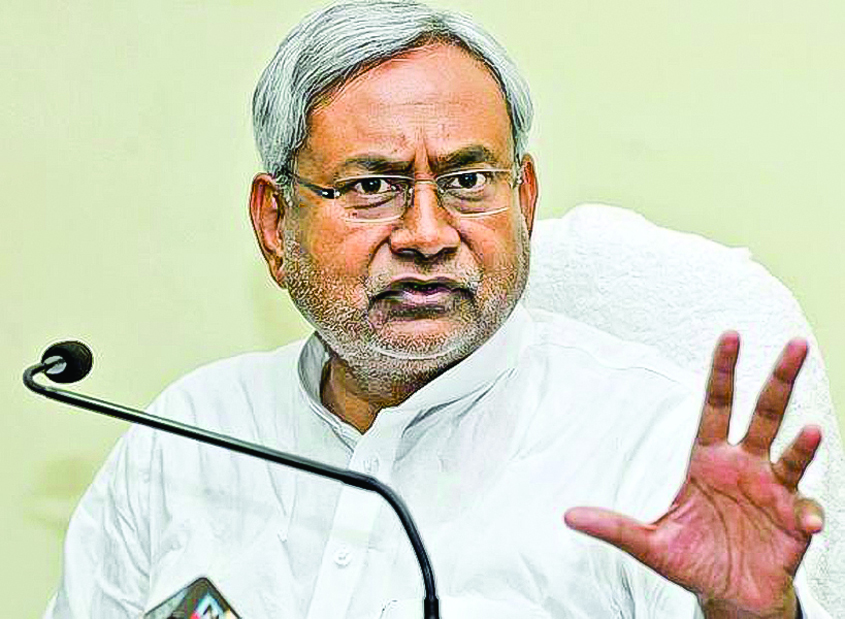“This was long due. We have not forgotten how the RJD plundered the state in its 15-year rule; we all lived in terror as children,” said Anish Sharma, a youth in his late 20s, who works in a software firm in Patna. “Der aaye durust aaye (better late than never)”, was the brisk reaction of Prashant Priyadarshi, a major in the Army, whose family is settled in Danapur Assembly constituency. “This was the best decision ever taken by Nitish Kumar. We are happy he made up for the mistake of 2013,” he exclaimed, summing up how the urban voters in the state were unhappy with Kumar’s decision to end the JDU-BJP coalition, which had rescued the state from the infamous “jungle raj” of Lalu Yadav and his wife Rabri Devi, Chief Ministers from 1990 to 2004.
But political observers from the state believe that it will be premature to conclude the JDU and the BJP will sweep future elections. The initial reactions from the Muslims suggest that it might prove to be a Herculean task for the Bihar Chief Minister to retain his goodwill within the community. “What can be a bigger betrayal than this?” opined a Muslim techie based in Dhanbad, who is a voter from Patna. “The 2015 election was fought totally on ideological ground, with the BJP going to the extent of saying that Pakistan will burst crackers if they lost. Yet they lost, because the mandate was a stamp of disapproval of their politics. Nitish Kumar has resurrected that politics by joining hands with them,” he added, while refusing to be named.
A group of Muslim youths from Bhagalpur lambasted Nitish Kumar for breaking ties with the RJD, ostensibly to fight corruption: “Lalu was clean before the 2015 election, but now is too corrupt to be an ally… Narendra Modi had been communal for Nitish all through but is now secular to join hands with. This is sheer
Although Nitish Kumar was the first choice of the Muslims and Yadavs in any election—the RJD continued to secure the maximum number of votes from them—the fact that he got a sizable vote share from these two communities was crucial to upset the Lalu Yadav-led party. According to a CSDS-Lokniti survey of 2014, in the 2010 Assembly elections, although the RJD got a staggering 26% of the Muslim votes, Kumar’s JDU broke up a Muslim consolidation for its rival by pulling in 17% votes from the community and another 6% for ally BJP. Political observers believe unless Nitish Kumar is able to retain his hold with the Yadavs and Muslims, the arithmetic may not be easy.
The RJD and the Congress, although they performed dismally in the 2005 and 2010 Assembly elections in terms of seats won, polled a decent percentage of votes. In the 2010 election, which they contested separately, the RJD and the Congress had secured 18.84% and 8.38% votes respectively, whereas allies JDU and BJP were ahead at 22.61% and 16.46% respectively. In terms of seats, the NDA won overwhelmingly with 206 of 243 seats. Political observers credit this win to the division of the minority and Yadav votes and the absence of any alliance between the RJD and the Congress.
A Muslim lecturer based in Patna, said on the condition of anonymity that it would be difficult to root for the JDU-BJP in the future, not because of a loss of faith in Nitish Kumar’s development plank, but because the dynamics within the NDA had changed. “When we used to vote for the JDU, we were sure Nitish Kumar was the senior player in the alliance, and controlled decision making. But now the BJP is the most powerful political party and it is also ruling at the Centre. We are not sure whether Nitish Kumar will have the same say. Moreover, unlike in the past, there is a renewed fear among the minorities with cow vigilantism and mob-lynching of Muslims hitting headlines every day under the Central government,” she said.
Most Yadav voters this newspaper spoke to said they would wait and watch. “Nitish Kumar may not have been from our community, but he had accommodated us well in the past; he gave us tickets to contest elections. If we see that he is in a winning position and that is working for the Yadavs, a number of us may vote for him,” said one Raju Yadav, a stationary shop owner in Ashok Rajpath, Patna. Another Yadav youth, Ashish, said, “There is no question of voting for Nitish Kumar. He was clearly threatened by Tejashwi’s (Deputy CM in the Grand Alliance government) popularity as a youth leader. He prepared the script with BJP to sabotage him and described it as his “call of conscience”. This was all too apparent.”
However, despite reservations among the Muslims and Yadavs, most BJP-JDU voters said the NDA would have an unbeatable numerical superiority.
In the 2014 general elections, which the BJP, JDU and the RJD fought separately, the BJP and the JDU polled 29.4% and 15.8% votes respectively, way ahead of RJD’s 20.1% and Congress’ 8.4%. Even in the 2015 Assembly elections, when the JDU and the RJD fought together, the BJP secured a staggering 24.4% votes. The JDU got 16.8%, while the RJD won 18.4% and Congress 6.7%.
The lecturer quoted above did not deny the possibility of some Muslims, in particular OBC Muslims, continuing to vote for the JDU if Nitish Kumar works for their uplift and gives them adequate representation like in the past. “His minority welfare programmes, such as the Bihar Minority Financial Corporation, had yielded real benefits for the Muslim poor. If the efforts continue, they might just support him,” she summed up.
Seconded Martina Xavier, a teacher in a Jesuit school in Patna: “Whereas the RJD is promoting goonda raj, the BJP is creating friction on religious lines. Nitish Kumar is a good man and he is doing well. I think people will vote for the JDU only.”

